Does your cat have asthma?
Humans aren’t the only ones that can suffer from asthma. One of the most common
respiratory diseases in cats, asthma affects between 1-5% of cats. The average age
of cats diagnosed is between 4-5 years. We have several cats that have asthma and
receive treatment twice a day.
If you think your cat may have asthma, it’s important to see your veterinarian to get a
proper diagnosis and treatment plan. Here’s some helpful information to give you a
little background so you feel more prepared for your visit.
Described as a constriction of the airways, asthma occurs when the immune system
overreacts to an allergen, resulting in inflammation. Cat asthma is not contagious.
While it has been hypothesized that genetics may play an underlying role, research
in this area is still ongoing. The professional consensus is that if a cat has asthma,
symptoms can be triggered by a host of environmental factors.
“While the exact cause of feline asthma remains unknown, the prevailing thought in
veterinary medicine is that the symptoms of asthma are triggered by an allergic
response to inhaled airborne particles,” said Purina veterinarian Dr. Kurt Venator,
DVM, Ph.D. and Chief Veterinary Officer. “It can be a challenging condition to
manage, as asthmatic cats can react to so many potential irritants in the
environment.”
Classic signs of cat asthma include difficulty breathing, cat coughing and wheezing,
along with many other signs. While it’s not curable, there are simple steps
responsible pet owners can take today to help their feline companions breathe
easier.
Journal Cat Coughing & Wheezing
If your cat does have asthma, it can be challenging to discover what is triggering the
symptoms. In order to find out, owners will likely have to make changes in their
home. Keep a journal and begin eliminating possible irritants. Evaluate and note any
changes you see in your cat. This can be a slow process, but it’s vital in order to
understand the cause of their symptoms. Remember, the signs of cat asthma can be
exacerbated by a myriad of potential irritants in the environment.
Minimize Irritants that Can Cause Cats with Asthma to Cough or Wheeze
Cat owners are encouraged to avoid any potential environmental irritants such as
mold, pollen, cigarette smoke, perfume, dust, etc. Clean your house more frequently,
vacuum and change air filters to help keep the air clean. Try to be mindful of
household cleaning agents, as some scented cleaners and air fresheners may serve
as irritants.
We have several cats that must receive aerosol treatments for their asthma.
This is done with an aerosol canister that holds the medication to give your
cat time to more effectively inhale the medication. The most popular one is
the Aerokat. You may get it from Amazon or their website. You do not have
to mash it on their face or anything, we just gently hold it and let them breath
in the medicine several times.
Read more here:
https://www.vet.cornell.edu/departments-centers-and-institutes/cornell-feline-health-
center/health-information/feline-health-topics/feline-asthma-what-you-need-know
https://www.purina.com/articles/cat/litter/understanding-cat-asthma
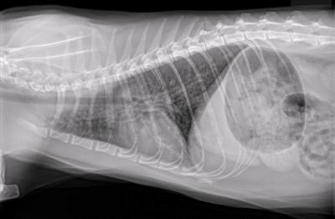
Lungs of a kitty with asthma
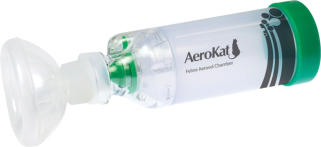
An Aerokat Asthma Aerosol Chamber
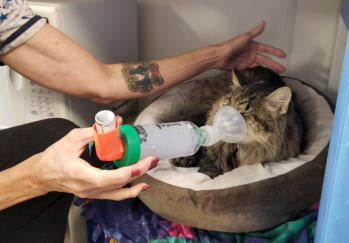
Snicker getting a treatment with his
Aerokat
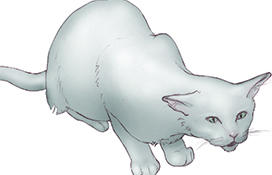
Cats suffering from asthma attacks often assume a
characteristic crouched posture and extend the head
and neck forward while wheezing or coughing
Donate Now
Donate Monthly
Sponsor
Wishlist
Other ways to help
Ebay
Donate your car
Donate your birthday
CFC
Amazon Smile
Memorials - page 1
Memorials - page 2
Memorials - page 3
Memorials - page 4
Memorials - page 5
Memorials - page 6
Memorials - page 7
Memorials - page 8
Memorials - page 9
Memorials - page 10
Memorials - page 11
Memorials - page 12









Sections
Thank you to our sponsors!
Does your cat have asthma?
Humans aren’t the only ones that can suffer from
asthma. One of the most common respiratory diseases
in cats, asthma affects between 1-5% of cats. The
average age of cats diagnosed is between 4-5 years.
We have several cats that have asthma and receive
treatment twice a day.
If you think your cat may have asthma, it’s important
to see your veterinarian to get a proper diagnosis
and treatment plan. Here’s some helpful information
to give you a little background so you feel more
prepared for your visit.
Described as a constriction of the airways, asthma
occurs when the immune system overreacts to an
allergen, resulting in inflammation. Cat asthma is
not contagious. While it has been hypothesized that
genetics may play an underlying role, research in
this area is still ongoing. The professional consensus
is that if a cat has asthma, symptoms can be triggered
by a host of environmental factors.
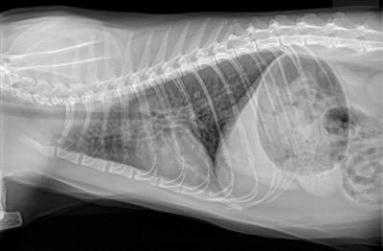
Lungs of a kitty with asthma
“While the exact cause of feline asthma remains
unknown, the prevailing thought in veterinary
medicine is that the symptoms of asthma are
triggered by an allergic response to inhaled
airborne particles,” said Purina veterinarian
Dr. Kurt Venator, DVM, Ph.D. and Chief
Veterinary Officer. “It can be a challenging
condition to manage, as asthmatic cats can react
to so many potential irritants in the environment.”
Classic signs of cat asthma include difficulty
breathing, cat coughing and wheezing, along with
many other signs. While it’s not curable, there are
simple steps responsible pet owners can take today
to help their feline companions breathe easier.
Journal Cat Coughing & Wheezing:
If your cat does have asthma, it can be challenging
to discover what is triggering the symptoms. In
order to find out, owners will likely have to make
changes in their home. Keep a journal and begin
eliminating possible irritants. Evaluate and note any
changes you see in your cat. This can be a slow
process, but it’s vital in order to understand the
cause of their symptoms. Remember, the signs
of cat asthma can be exacerbated by a myriad of
potential irritants in the environment.
Minimize Irritants that Can Cause Cats with
Asthma to Cough or Wheeze :
Cat owners are encouraged to avoid any potential
environmental irritants such as mold, pollen,
cigarette smoke, perfume, dust, etc. Clean your
house more frequently, vacuum and change air
filters to help keep the air clean. Try to be mindful of
household cleaning agents, as some scented
cleaners and air fresheners may serve as irritants.

Cats suffering from asthma attacks often assume a
characteristic crouched posture and extend the head
and neck forward while wheezing or coughing

An Aerokat Asthma Aerosol Chamber
We have several cats that must receive aerosol
treatments for their asthma. This is done with an
aerosol canister that holds the medication to give
your cat time to more effectively inhale the
medication. The most popular one is the Aerokat.
You may get it from Amazon or their website.
You do not have to mash it on their face or anything,
we just gently hold it and let them breath
in the medicine several times.
Read more here:
And another good article Here
























